Monthly Updates on Recent Books in the History of Christianity
Due to the cancellation of many conferences in the past months amid the COVID-19 pandemic, many of us have had less opportunity to browse or even see new books coming out in our fields. To raise awareness of recent books in the history of Christianity, the editorial staff of Church History: Studies in Christianity and Culture highlights each month a list of 10-15 books in diverse periods and geographical regions that we hope will be of interest to our members. We include here below the sixth monthly list, chosen by our staff, with excerpts from the publishers’ blurbs.
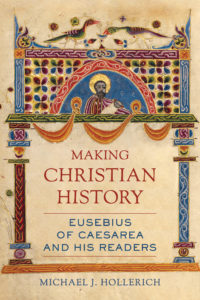
Michael Hollerich, Making Christian History: Eusebius of Caesarea and His Readers. 2021
University of California Press
Known as the "Father of Church History," Eusebius was bishop of Caesarea in Palestine and the leading Christian scholar of his day. His Ecclesiastical History is an irreplaceable chronicle of Christianity’s early development, from its origin in Judaism, through two and a half centuries of illegality and occasional persecution, into a new era of tolerance and favor under the Emperor Constantine.
In this book, Michael J. Hollerich recovers the reception of this text across time. As he shows, Eusebius adapted classical historical writing for a new "nation," the Christians, with a distinctive theo-political vision. Eusebius's book left its mark on Christian historical writing from late antiquity to the early modern period, across linguistic, cultural, political, and religious boundaries, until its encounter with modern historicism and postmodernism. Making Christian History demonstrates Eusebius's vast influence throughout history, not simply in shaping Christian culture but also as his work itself has become contested territory as that culture has been constantly reevaluated, reformed, and resisted over the past 1,700 years.
See publisher's website.
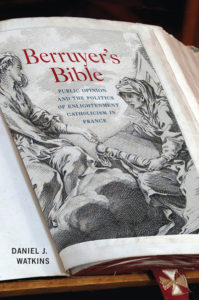
Daniel J. Watkins, Berruyer’s Bible: Public Opinion and the Politics of Enlightenment Catholicism in France. 2021
McGill-Queen’s University Press
The French Jesuit Isaac-Joseph Berruyer's Histoire du peuple de Dieu was an ambitious attempt to connect the ideas of the Enlightenment with the theology of the Catholic Church. A paraphrase of the Bible written in vernacular French, the Histoire promoted progress, the pursuit of happiness, the fundamental goodness of humanity, and the capacity of nature to shape moral human beings. Berruyer aimed to update the Bible for a new age, but his work unleashed a furor that ended with the expulsion of the Jesuits from France. Berruyer's Bible offers a fresh perspective on the history of the Catholic Enlightenment.
By exploring the rise and fall of Berruyer's Histoire, Daniel Watkins reveals how Catholic attempts to assimilate Enlightenment ideas caused conflicts within the church and between the church and the French state. Berruyer's Bible flips the traditional narrative of the Enlightenment on its head by showing that the secularization of French society and the political decline of the Catholic Church were due not solely to the external assaults of anti-clerical philosophes but also to the internal discord caused by Catholic theologians themselves. Built upon extensive research in archives across Western Europe and the United States, Berruyer's Bible paints a vivid picture of the tumultuous intellectual world of the Catholic Church and the power of radical ideas that shaped the church throughout the Enlightenment, the French Revolution, and beyond.
See publisher's website.
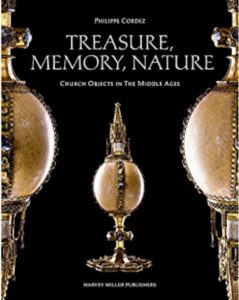
Philippe Cordez, Treasure, Memory, Nature: Church Objects in the Middle Ages. 2020
This book traces the origins, economic development, and later history of church treasures, and explores the forms and function of these objects of memory and wonder.
Precious metalwork, relics, chess pieces, ostrich eggs, unicorn horns, and bones of giants were among the treasury objects accumulated in churches during the Middle Ages. The material manifestations of a Christian worldview, they would only later become naturalia and objets d’art, from the sixteenth and the nineteenth century onwards, respectively.
Philippe Cordez traces the rhetorical origination, economic development, and later history of church treasures, and explores the forms and functions of the memorial objects that constituted them. Such objects were a source of wonder for their contemporaries and remain so today, albeit for quite different reasons. Indeed, our fascination relates primarily to their epistemic and aesthetic qualities. Dealing also with these paradigm shifts, this study opens up new paths toward an archeology of current scholarly and museum practices.
See publisher's website.
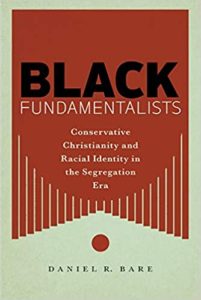
Daniel R. Bare, Black Fundamentalists: Conservative Christianity and Racial Identity in the Segregation Era. 2021
Black Fundamentalists challenges the idea that fundamentalism was an exclusively white phenomenon. The volume uncovers voices from the Black community that embraced the doctrinal tenets of the movement and, in many cases, explicitly self-identified as fundamentalists. Fundamentalists of the early twentieth century felt the pressing need to defend the “fundamental” doctrines of their conservative Christian faith―doctrines like biblical inerrancy, the divinity of Christ, and the virgin birth―against what they saw as the predations of modernists who represented a threat to true Christianity. Such concerns, attitudes, and arguments emerged among Black Christians as well as white, even as the oppressive hand of Jim Crow excluded African Americans from the most prominent white-controlled fundamentalist institutions and social crusades, rendering them largely invisible to scholars examining such movements.
Black fundamentalists aligned closely with their white counterparts on the theological particulars of “the fundamentals.” Yet they often applied their conservative theology in more progressive, racially contextualized ways. While white fundamentalists were focused on battling the teaching of evolution, Black fundamentalists were tying their conservative faith to advocacy for reforms in public education, voting rights, and the overturning of legal bans on intermarriage. Beyond the narrow confines of the fundamentalist movement, Daniel R. Bare shows how these historical dynamics illuminate larger themes, still applicable today, about how racial context influences religious expression.
See publisher's website.
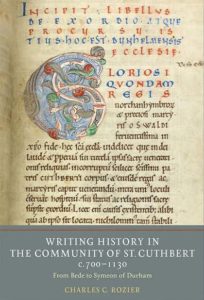
Charles C. Rozier, Writing History in the Community of St Cuthbert, c.700-1130: From Bede to Symeon of Durham. 2020
Boydell and Brewer- York Medieval Press
Historical texts of all kinds were written in the community of St Cuthbert c.700-1130, from short annals to extended narrative history, political tracts and works on the lives and miracles of saints. At the same time, scribes in the community worked to copy and procure notable classics of historiography, from Classical Antiquity down to the Norman Conquest of England. But what did these various forms of writing about past events mean to their original authors and readers? What were these texts for?
This book offers a narrative of historiographical production within St Cuthbert's community from the time of its foundation on the island of Lindisfarne, through subsequent translations to Chester-le-Street and Durham, down to the vibrant intellectual revival of the Anglo-Norman period. Focusing on several watershed moments in the story of this community, it identifies political, religious, intellectual and cultural triggers for historical writing, and argues that knowledge of past events gave successive guardians of Cuthbert's cult their single most valuable tool in the continuous effort to define who they were, where they had come from, and what they hoped to continue to be.
See publisher's website.
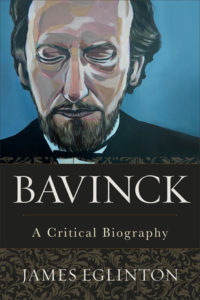
James Eglinton, Bavinck: A Critical Biography. 2020
Dutch Calvinist theologian Herman Bavinck, a significant voice in the development of Protestant theology, remains relevant many years after his death. His four-volume Reformed Dogmatics is one of the most important theological works of the twentieth century.
James Eglinton is widely considered to be at the forefront of contemporary interest in Bavinck's life and thought. After spending considerable time in the Netherlands researching Bavinck, Eglinton brings to light a wealth of new insights and previously unpublished documents to offer a definitive biography of this renowned Reformed thinker.
The book follows the course of Bavinck's life in a period of dramatic social change, identifying him as an orthodox Calvinist challenged with finding his feet in late modern culture. Based on extensive archival research, this critical biography presents numerous significant and previously ignored or unknown aspects of Bavinck's person and life story.
See publisher's website.
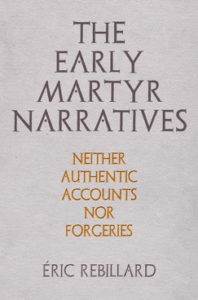
Éric Rebillard, The Early Martyr Narratives: Neither Authentic Accounts Nor Forgeries. 2021
University of Pennsylvania Press
From Eusebius of Caesarea, who first compiled a collection of martyr narratives around 300, to Thierry Ruinart, whose Acta primorum martyrum sincera et selecta was published in 1689, the selection and study of early hagiographic narratives has been founded on an assumption that there existed documents written at the time of martyrdom, or very close to it. As a result, a search for authenticity has been and continues to be central, even in the context of today's secular scholarship. But, as Éric Rebillard contends, the alternative approach, to set aside entirely the question of the historical reliability of martyr narratives, is not satisfactory either. Instead, he argues that martyr narratives should be consider as fluid "living texts," written anonymously and received by audiences not as precise historical reports but as versions of the story. In other words, the form these texts took, between fact and fiction, made it possible for audiences to readily accept the historicity of the martyr while at the same time not expect to hear or read a truthful account.
In The Early Martyr Narratives, Rebillard considers only accounts of Christian martyrs supposed to have been executed before 260, and only those whose existence is attested in sources that can be dated to before 300. The resulting small corpus contains no texts in the form of legal protocols, traditionally viewed as the earliest, most official and authentic records, nor does it include any that can be dated to a period during which persecution of Christians is known to have taken place. Rather than deduce from this that they are forgeries written for the sake of polemic or apologetic, Rebillard demonstrates how the literariness of the narratives creates a fictional complicity that challenges and complicates any claims of these narratives to be truthful.
See publisher's website.
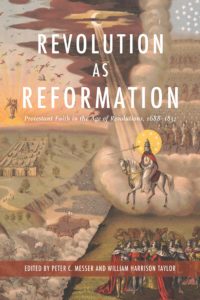
Peter C. Messer and William Harrison Taylor, eds. Revolution as Reformation: Protestant Faith in the Age of Revolutions, 1688-1832. 2021
The University of Alabama Press
Revolution as Reformation: Protestant Faith in the Age of Revolutions, 1688–1832 highlights the role that Protestantism played in shaping both individual and collective responses to revolution. These essays explore the various ways that the Protestant tradition, rooted in a perpetual process of recalibration and reformulation, provided the lens through which Protestants experienced and understood social and political change in the Age of Revolutions. In particular, they call attention to how Protestants used those changes to continue or accelerate the Protestant imperative of refining their faith toward an improved vision of reformed religion.
The editors and contributors define faith broadly: they incorporate individuals as well as specific sects and denominations, and as much of “life experience” as possible, not just life within a given church. In this way, the volume reveals how believers combined the practical demands of secular society with their personal faith and how, in turn, their attempts to reform religion shaped secular society.
The wide-ranging essays highlight the exchange of Protestant thinkers, traditions, and ideas across the Atlantic during this period. These perspectives reveal similarities between revolutionary movements across and around the Atlantic. The essays also emphasize the foundational role that religion played in people’s attempts to make sense of their world, and the importance they placed on harmonizing their ideas about religion and politics. These efforts produced novel theories of government, encouraged both revolution and counterrevolution, and refined both personal and collective understandings of faith and its relationship to society.
See publisher's website.
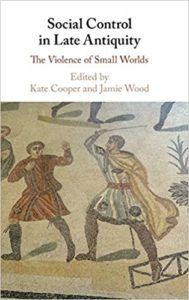
Kate Cooper and Jamie Wood, eds. Social Control in Late Antiquity: The Violence of Small Worlds. 2020
Social Control in Late Antiquity: The Violence of Small Worlds explores the small-scale communities of late antiquity – households, monasteries, and schools – where power was a question of personal relationships. When fathers, husbands, teachers, abbots, and slave-owners asserted their own will, they saw themselves as maintaining the social order, and expected law and government to reinforce their rule. Naturally, the members of these communities had their own ideas, and teaching them to 'obey their betters' was not always a straightforward business. Drawing on a wide variety of sources from across the late Roman Mediterranean, from law codes and inscriptions to monastic rules and hagiography, the book considers the sometimes conflicting identities of women, slaves, and children, and documents how they found opportunities for agency and recognition within a system built on the unremitting assertion of the rights of the powerful.
See publisher's website.
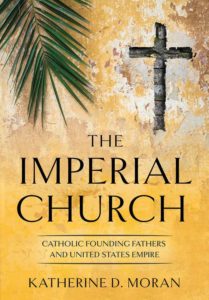
Katherine D. Moran, The Imperial Church: Catholic Founding Fathers and the United States Empire. 2020
Through a fascinating discussion of religion's role in the rhetoric of American civilizing empire, The Imperial Church undertakes an exploration of how Catholic mission histories served as a useful reference for Americans narrating US settler colonialism on the North American continent and seeking to extend military, political, and cultural power around the world. Katherine D. Moran traces historical celebrations of Catholic missionary histories in the upper Midwest, Southern California, and the US colonial Philippines to demonstrate the improbable centrality of the Catholic missions to ostensibly Protestant imperial endeavors.
Moran shows that, as the United States built its continental and global dominion and an empire of production and commerce in the Gilded Age and Progressive Era, Protestant and Catholic Americans began to celebrate Catholic imperial pasts. She demonstrates that American Protestants joined their Catholic compatriots in speaking with admiration about historical Catholic missionaries: the Jesuit Jacques Marquette in the Midwest, the Franciscan Junípero Serra in Southern California, and the Spanish friars in the Philippines. Comparing them favorably to the Puritans, Pilgrims, and the American Revolutionary generation, commemorators drew these missionaries into a cross-confessional pantheon of US national and imperial founding fathers. In the process, they cast Catholic missionaries as gentle and effective agents of conquest, uplift, and economic growth, arguing that they could serve as both origins and models for an American civilizing empire.
The Imperial Church connects Catholic history and the history of US empire by demonstrating that the religious dimensions of American imperial rhetoric have been as cross-confessional as the imperial nation itself.
See publisher's website.
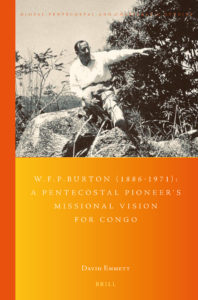
David Emmett, W.F.P Burton (1886-1971): A Pentecostal Pioneer’s Missional Vision for Congo. 2021
Emmett contributes to missional pentecostal historiography through bringing a pre-eminent figure in early British Pentecostalism into the limelight. He shows how Pentecostalism in Belgian Congo was pioneered by W.F.P. Burton alongside local agency. Central to Burton’s contradictory and complex personality was a passionate desire to see the emancipation of humankind from the spiritual powers of darkness believing only Spirit-empowered local agency would enduringly prove effective.
Burton’s faith believed for Spirit intervention in church communities converting lives, bringing physical healing and transforming regions. In the maelstrom following Congolese Independence, Burton’s belief in his own brand of indigenisation made him an outlier even among Pentecostals. Burton’s pentecostal faith engendered an idealism which frustratingly conflicted with those not sharing it in the way he pursued it. This book thus serves Pentecostals and historians by clarifying Burton’s ideals and revealing the reasons for his frustrations.
See publisher's website.
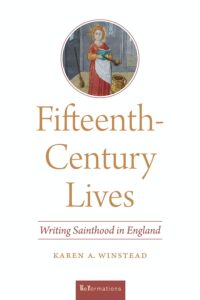
Karen A. Winstead, Fifteenth-Century Lives: Writing Sainthood in England. 2020
In Fifteenth-Century Lives, Karen A. Winstead identifies and explores a major shift in the writing of Middle English saints’ lives. As she demonstrates, starting in the 1410s and ’20s, hagiography became more character-oriented, more morally complex, more deeply embedded in history, and more politically and socially engaged. Further, it became more self-consciously literary and began to feature women more prominently—and not only traditional virgin martyrs but also matrons and contemporary holy women. Winstead shows that this literature placed a premium on scholarship and teaching. Hagiography celebrated educators and scholars to a greater extent than ever before and became a vehicle for educating readers about Christian dogma. Focusing both on authors well known, such as John Lydgate and Margery Kempe, and on others less known, such as Osbern Bokenham and John Capgrave, Winstead argues that the values promoted by fifteenth-century hagiography helped to shape the reformist impulses that eventually produced the Reformation. Moreover, these values continued to influence post-Reformation hagiography, both Protestant and Catholic, well into the seventeenth century.
In exploring these trends in fifteenth-century hagiography, identifying the factors that contributed to their emergence, and tracing their influence in later periods, Fifteenth-Century Lives marks an important contribution to revisionary scholarship on fifteenth-century literature. It will appeal to students and scholars of late medieval English literature and late medieval religion.
See publisher's website.
Finally, for staying up-to-date on the latest titles in all fields, we recommend regularly perusing New Books Network and its "New Books in Christian Studies” page. These pages are updated regularly.
